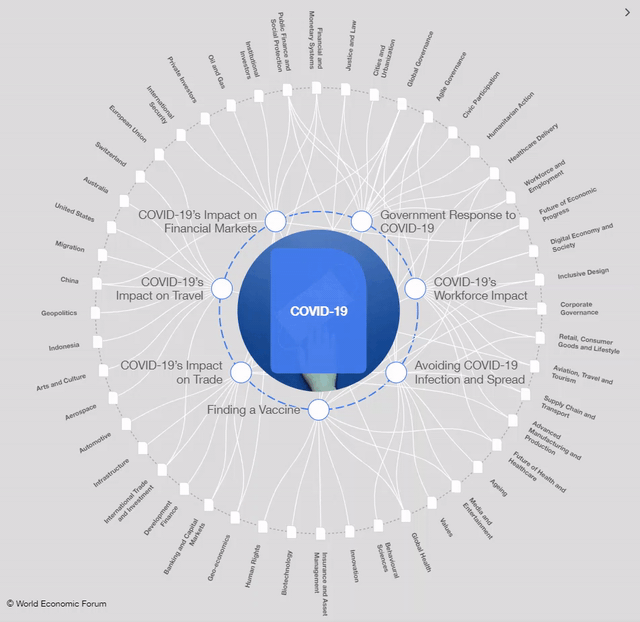Track the spread of coronavirus around the world

Volunteers disinfect a railway station in China.
Image: REUTERS
Explore and monitor how COVID-19 is affecting economies, industries and global issues
Stay up to date:
COVID-19
This article was updated on 20 April 2020.
- Since the first detection of COVID-19 in China at the end of last year, it has spread to more than 200 countries and territories.
- Here's a visualization tracking its spread.
As the world continues to grapple with the disruptive impact of COVID-19, its origins remain mysterious.
Though differing accounts have been offered, what we know for certain is that the coronavirus was first detected during the final days of 2019 in Wuhan, a Chinese city of about 11 million people in Hubei province – perhaps previously best known in the West as home to the Three Gorges Dam.
Since then, confirmed cases have been reported in more than 200 countries and territories. Using data from the World Health Organization and other sources, the World Economic Forum has created a visualization tracking its spread.
What is the World Economic Forum doing about the coronavirus outbreak?
The WHO began issuing situation reports about a pneumonia of “unknown cause” on 21 January, when 278 of its 282 confirmed cases had been reported in China. The visualization begins by tracing the early spread of what eventually became known as COVID-19 within that country.
Below we see Hubei province quickly turn a dark red as the number of confirmed cases there reaches into the hundreds. The shading of other provinces also darkens as their number of reported cases increases. By 19 April – following a period of leveling off – there were 84,237 reported cases in China, according to Chinese government agencies.
More than 150,000 people have reportedly died as a result of COVID-19 to date. As of 21 January, there were six reported deaths, all of them in Wuhan. However, confirmed cases had already spread to three other countries in Asia.
Below we see the spread of reported COVID-19 cases throughout Asia over time (Japan’s tally includes those on a cruise ship in Japanese territorial waters). By 19 April the WHO was reporting 158,015 cases in the Western Pacific and South-East Asia regions.
It took a while for Europe to report a significant uptick in cases. As of 25 January, there were still just three confirmed in the region, all in France.
That changed quickly when the number of reported cases in Italy began to spike in late February – an increase that’s reflected below (Spain, France, Germany, and the United Kingdom have also reported sharp increases). As of 19 April, the WHO was reporting 1,122,189 European cases in total.
In the US, the first confirmed case arrived relatively early when a 35-year-old man in Washington state checked into an urgent care centre with a nagging cough on 19 January. As of 20 February the WHO was still reporting just 15 confirmed cases in the US. By 19 April, state and local agencies and hospitals in the country were reporting a total of 759,696 cases – indicated below in expanding dots centred over each affected location.
Nigeria reported the first confirmed case in sub-Saharan Africa on 28 February. South Africa, which didn’t report an initial case until 5 March, later suffered a spike that triggered a nationwide lockdown. Scientists have expressed concern that the spread of the coronavirus will wreak havoc on African countries with relatively weak and overburdened health systems. As of 19 April, the WHO was reporting 13,892 cases in the African Region.
The impact of COVID-19 has now spread across the globe, decimating stock markets, closing schools, triggering job losses and border controls, and spurring many people to stockpile food. Below we see the spread of confirmed coronavirus cases worldwide. As of 19 April, the WHO was reporting 2,241,778 cases in total.
The World Economic Forum’s Strategic Intelligence platform contextualizes global issues, industries, and countries in an interactive tool. Many of the topics, including COVID-19, feature data visualizations under the “data” tab. You'll need to register to view.
Don't miss any update on this topic
Create a free account and access your personalized content collection with our latest publications and analyses.
License and Republishing
World Economic Forum articles may be republished in accordance with the Creative Commons Attribution-NonCommercial-NoDerivatives 4.0 International Public License, and in accordance with our Terms of Use.
The views expressed in this article are those of the author alone and not the World Economic Forum.
Forum Stories newsletter
Bringing you weekly curated insights and analysis on the global issues that matter.
More on Health and Healthcare SystemsSee all
Naoko Tochibayashi and Mizuho Ota
April 7, 2025
Charlotte Ersboll and Kusum Kali Pal
April 7, 2025
Vivek Vishal
March 31, 2025







